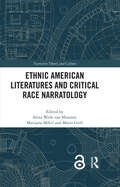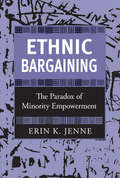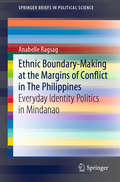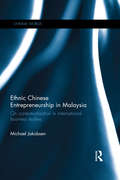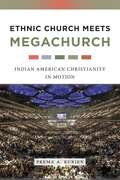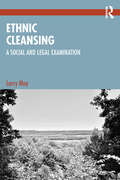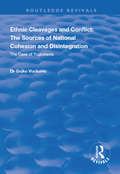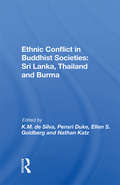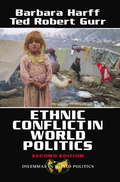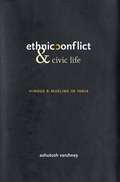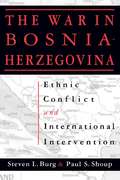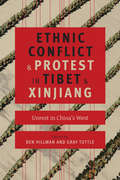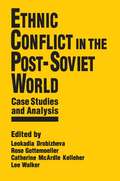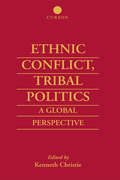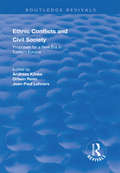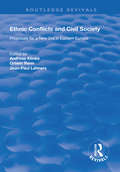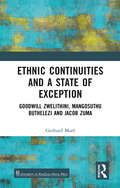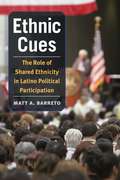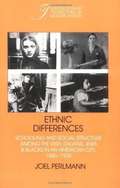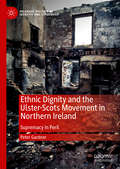- Table View
- List View
Ethnic American Literatures and Critical Race Narratology (Narrative Theory and Culture)
by von Mossner, Alexa WeikEthnic American Literatures and Critical Race Narratology explores the relationship between narrative, race, and ethnicity in the United States. Situated at the intersection of post-classical narratology and context-oriented approaches in race, ethnic, and cultural studies, the contributions to this edited volume interrogate the complex and varied ways in which ethnic American authors use narrative form to engage readers in issues related to race and ethnicity, along with other important identity markers such as class, religion, gender, and sexuality. Importantly, the book also explores how paying attention to the formal features of ethnic American literatures changes our under-standing of narrative theory and how narrative theories can help us to think about author functions and race. The international and diverse group of contributors includes top scholars in narrative theory and in race and ethnic studies, and the texts they analyze concern a wide variety of topics, from the representation of time and space to the narration of trauma and other deeply emotional memories to the importance of literary paratexts, genre structures, and author functions.
Ethnic Americans: A History of Immigration
by Leonard DinnersteinFor more than three decades, Ethnic Americans has been hailed as a classic history of immigration to America. Leonard Dinnerstein and David M. Reimers begin with a brief overview of immigration during the colonial and early national eras (1492 to the 1820s), focusing primarily on the arrival of English Protestants, while at the same time stressing the diversity brought by Dutch, French, Spanish, and other small groups, including "free people of color" from the Caribbean. Next they follow large-scale European immigration from 1830 to the 1880s. Catholicism became a major force in America during this period, with immigrants-five million in the 1880s alone-creating a new mosaic in every state of the Union. This section also touches on the arrival, beginning in 1848, of Chinese immigrants and other groups who hoped to find gold and get rich. Subsequent chapters address eastern and southern European immigration from 1890 to 1940; newcomers from the Western Hemisphere and Asia who arrived from 1840 to 1940; immigration restriction from 1875 to World War II; and the postwar arrival and experiences of Asian, Mexican, Hungarian, and Cuban refugees. Taking the past fifteen years into account, the fifth edition of Ethnic Americans considers recent influxes of Asians and Hispanics, especially the surge in the Mexican population, and includes expanded coverage of nativist sentiment in American politics and thought.
Ethnic Bargaining: The Paradox of Minority Empowerment
by Erin K. JenneIn Ethnic Bargaining, Erin K. Jenne introduces a theory of minority politics that blends comparative analysis and field research in the postcommunist countries of East Central Europe with insights from rational choice. Jenne finds that claims by ethnic minorities have become more frequent since 1945 even though nation-states have been on the whole more responsive to groups than in earlier periods. Minorities that perceive an increase in their bargaining power will tend to radicalize their demands, she argues, from affirmative action to regional autonomy to secession, in an effort to attract ever greater concessions from the central government.The language of self-determination and minority rights originally adopted by the Great Powers to redraw boundaries after World War I was later used to facilitate the process of decolonization. Jenne believes that in the 1960s various ethnic minorities began to use the same discourse to pressure national governments into transfer payments and power-sharing arrangements. Violence against minorities was actually in some cases fueled by this politicization of ethnic difference.Jenne uses a rationalist theory of bargaining to examine the dynamics of ethnic cleavage in the cases of the Sudeten Germans in interwar Czechoslovakia; Slovaks and Moravians in postcommunist Czechoslovakia; the Hungarians in Romania, Slovakia, and Vojvodina; and the Albanians in Kosovo. Throughout Ethnic Bargaining, she challenges the conventional wisdom that partisan intervention is an effective mechanism for protecting minorities and preventing or resolving internal conflict.
Ethnic Boundary-Making at the Margins of Conflict in The Philippines: Everyday Identity Politics in Mindanao (SpringerBriefs in Political Science)
by Anabelle RagsagThis book makes a significant interdisciplinary contribution to existing scholarship on ethnicity, conflict, nation-making, colonial history and religious minorities in the Philippines, which has been confronted with innumerable issues relating to their ethnic and religious minority populations. Using Sarangani Bay as a research site, the book zones in on the lives of the Muslim Sinamas and the Christianized indigenous B'laans as they navigate the effects of the ongoing turmoil in the Bangsamoro region in Muslim Mindanao—a multi-faceted conflict involving numerous armed groups, as well as clans, criminal gangs and political elites. This work considers the factors affecting the Muslim Moro people, who have long been struggling for their right to self-determination. The conflict in the Moro areas has evolved over the past five decades from an ethnonationalist struggle between an aggrieved minority and a thorny issue for the central government: a highly fragmented conflict with multiple overlapping causes of violence. The book provides a framework for understanding the ethnic separatism in the case of the southern part of the country, framed by the concept of ethnic boundaries. Providing an excellent blend of theory and empirical evidence, the author confronts how ethno-religious divisions adversely impact the quality of life and unpacks how these divisions challenge multiculturalist policies. Weaving together multiple branches of the social sciences, this book is of interest to policymakers, researchers and students interested in international relations and political science, Asian studies, ethnic studies, Philippines’ history, sociology and anthropology.
Ethnic Chinese Entrepreneurship in Malaysia: On Contextualisation in International Business Studies (Chinese Worlds)
by Michael JakobsenThe study of ethnic Chinese in Southeast Asia has a long tradition. What is most striking in these studies is just how difficult it is to generalise about this ethnic group in the region. Whether or not they have been able to identify as Chinese has to a certain extend depended on different processes of social and political engineering, which in turn make them more or less distinct as an ethnic group. In the case of Malaysia, national political schemes such as the affirmative action policy indirectly force the Malaysian ethnic Chinese to conceive of themselves as a coherent collective, and yet, when asked Chinese entrepreneurs in the maintain that despite the affirmative action policy ethnicity is not the a defining deciding factor when it comes to identifying business partners. This book focuses on the consequences of these kinds of policies in the field of inter-ethnic business practices and entrepreneurship in Malaysia within the wider context of the relationship between local, national and global markets. It focuses on the complexities of inter-ethnic relations and in particular, the strong economic position of the ethnic Chinese and their impact on the Malaysian economic scene as well as on the wider Southeast Asian region, underlining the degree to which inter-ethnic relations in Southeast Asia are crucial to understanding the political and economic complexitiescharacteristic of characterizing the region. In turn, it takes small and medium-sized enterprises as case studies, and shows how they are being shaped and in return shape the society in which they constitute a part. In doing so, the book highlights how these companies not only relate to the domestic economy, but also cater to the global economy, and presents a compelling argument for the introduction of a glocalised perspective in international business studies. Ethnic Chinese Entrepreneurship in Malaysia will be welcomed by students and scholars with an interest in Asian studies, political economy, international business studies, inter-ethnic relations and diaspora studies.
Ethnic Church Meets Megachurch: Indian American Christianity in Motion (Sexual Cultures)
by Prema A KurienWinner, 2018 Section on Asia and Asian America Book Award presented by the American Sociological Association Traces the religious adaptation of members of an important Indian Christian church– the Mar Thoma denomination – as they make their way in the United States. This book exposes how a new paradigm of ethnicity and religion, and the megachurch phenomenon, is shaping contemporary immigrant religious institutions, specifically Indian American Christianity. Kurien draws on multi-site research in the US and India to provide a global perspective on religion by demonstrating the variety of ways that transnational processes affect religious organizations and the lives of members, both in the place of destination and of origin. The widespread prevalence of megachurches and the dominance of American evangelicalism created an environment in which the traditional practices of the ancient South Indian Mar Thoma denomination seemed alien to its American-born generation. Many of the young adults left to attend evangelical megachurches. Kurien examines the pressures church members face to incorporate contemporary American evangelical worship styles into their practice, including an emphasis on an individualistic faith, and praise and worship services, often at the expense of maintaining the ethnic character and support system of their religious community. Kurien’s sophisticated analysis also demonstrates how the forces of globalization, from the period of colonialism to contemporary out-migration, have brought about tremendous changes among Christian communities in the Global South. Wide in scope, this book is a must read for an audience interested in the study of global religions and cultures.
Ethnic Cleansing: A Social and Legal Examination
by Larry MayPutting forward the argument that the strength of democracies can be measured in how well minorities – especially ethnic and racial minorities – are treated by the majority, Larry May’s Ethnic Cleansing maintains that unjust ethnic cleansing is one of the greatest internal challenges to the modern institutions of pluralistic and multicultural states.In order to determine what constitutes the crime of ethnic cleansing, this book details crucial conceptual issues around the topic, such as what ethnicity means, what ethnic cleansing claims to achieve, why these acts are invariably harmful, and the conditions of restitution, reparation, and reconciliation – affirming that ethnic cleansing must be countered by existing institutions such as the International Criminal Court, which is uniquely situated to prosecute ethnic cleansing.The first major study to analyze ethnic cleansing from an explicitly normative and conceptual perspective in the last decade, the increase in number and complexity of cases of ethnic cleansing makes this a timely book to understand the challenges that confront contemporary society.
Ethnic Cleavages and Conflict: The Sources of National Cohesion and Disintegration - The Case of Yugoslavia (Routledge Revivals)
by Gojko VuckovicFirst published in 1997, this volume explores ethnic conflict alongside the creation and disintegration of the short-lived Yugoslav state, 17 years after the death of Tito. Processes of democratization tend to elicit differences within the population along deep-seated ethnic, religious and cultural differences. Dr. Gojko Vuekovic argues that the situation is no different in post-Cold War Yugoslavia. By setting out Yugoslavia’s worst-case scenario of ethnic tensions, Dr. Vuekovic hopes to inform responses to ethnic conflict in the wider modern world.
Ethnic Conflict In Buddhist Societies: Sri Lanka, Thailand, Burma
by Kinglsey M. De SilvaThis volume contains a selection of the papers presented at a South and South-east Asia regional workshop on 'Minorities in Buddhist Polities: Sri Lanka, Thailand and Burma', organised by the International Centre for Ethnic Studies (ICES), Sri Lanka, and the Thai Studies Programme of Chulalongkorn University, Thailand. The tenor for 'Minorities
Ethnic Conflict In World Politics
by Barbara Harff Ted Robert GurrThis second edition of Ethnic Conflict in World Politics is an introduction to a new era in which civil society, states, and international actors attempt to channel ethnic challenges to world order and security into conventional politics. From Africa's post-colonial rebellions in the 1960s and 1970s to anti-immigrant violence in the 1990s the authors survey the historical, geographic, and cultural diversity of ethnopolitical conflict. Using an analytical model to elucidate four well-chosen case studies-the Kurds, the Miskitos, the Chinese in Malaysia, and the Turks in Germany-the authors give students tools for analyzing emerging conflicts based on the demands of nationalists, indigenous peoples, and immigrant minorities throughout the world. The international community has begun to respond more quickly and constructively to these conflicts than it did to civil wars in divided Yugoslavia and genocide in Rwanda by using the emerging doctrines of proactive peacemaking and peace enforcement that are detailed in this book. Concludes by identifying five principles of international doctrine for managing conflict in ethnically diverse societies. The text is illustrated with maps, tables, and figures.
Ethnic Conflict In World Politics
by Barbara Harff Ted Robert GurrThis second edition of Ethnic Conflict in World Politics is an introduction to a new era in which civil society, states, and international actors attempt to channel ethnic challenges to world order and security into conventional politics. From Africa's post-colonial rebellions in the 1960s and 1970s to anti-immigrant violence in the 1990s the authors survey the historical, geographic, and cultural diversity of ethnopolitical conflict. Using an analytical model to elucidate four well-chosen case studies-the Kurds, the Miskitos, the Chinese in Malaysia, and the Turks in Germany-the authors give students tools for analyzing emerging conflicts based on the demands of nationalists, indigenous peoples, and immigrant minorities throughout the world. The international community has begun to respond more quickly and constructively to these conflicts than it did to civil wars in divided Yugoslavia and genocide in Rwanda by using the emerging doctrines of proactive peacemaking and peace enforcement that are detailed in this book. Concludes by identifying five principles of international doctrine for managing conflict in ethnically diverse societies. The text is illustrated with maps, tables, and figures.
Ethnic Conflict In World Politics
by Barbara Harff Ted Robert GurrThis second edition of Ethnic Conflict in World Politics is an introduction to a new era in which civil society, states, and international actors attempt to channel ethnic challenges to world order and security into conventional politics. From Africa's post-colonial rebellions in the 1960s and 1970s to anti-immigrant violence in the 1990s the authors survey the historical, geographic, and cultural diversity of ethnopolitical conflict. Using an analytical model to elucidate four well-chosen case studies--the Kurds, the Miskitos, the Chinese in Malaysia, and the Turks in Germany--the authors give students tools for analyzing emerging conflicts based on the demands of nationalists, indigenous peoples, and immigrant minorities throughout the world. The international community has begun to respond more quickly and constructively to these conflicts than it did to civil wars in divided Yugoslavia and genocide in Rwanda by using the emerging doctrines of proactive peacemaking and peace enforcement that are detailed in this book. Concludes by identifying five principles of international doctrine for managing conflict in ethnically diverse societies. The text is illustrated with maps, tables, and figures.
Ethnic Conflict In World Politics
by Barbara Harff Ted Robert GurrThis second edition of Ethnic Conflict in World Politics is an introduction to a new era in which civil society, states, and international actors attempt to channel ethnic challenges to world order and security into conventional politics. From Africa's post-colonial rebellions in the 1960s and 1970s to anti-immigrant violence in the 1990s the authors survey the historical, geographic, and cultural diversity of ethnopolitical conflict. Using an analytical model to elucidate four well-chosen case studies-the Kurds, the Miskitos, the Chinese in Malaysia, and the Turks in Germany-the authors give students tools for analyzing emerging conflicts based on the demands of nationalists, indigenous peoples, and immigrant minorities throughout the world. The international community has begun to respond more quickly and constructively to these conflicts than it did to civil wars in divided Yugoslavia and genocide in Rwanda by using the emerging doctrines of proactive peacemaking and peace enforcement that are detailed in this book. Concludes by identifying five principles of international doctrine for managing conflict in ethnically diverse societies. The text is illustrated with maps, tables, and figures.
Ethnic Conflict and Civic Life: Hindus and Muslims in India
by Ashutosh VarshneyThis timely book, updated for the paperback edition, examines how civic ties between Hindus and Muslims in different Indian cities serve to contain, or even prevent, ethnic violence. It is of interest not only to South Asian scholars and policymakers but also to those studying multiethnic societies in other areas of the world.
Ethnic Conflict and International Intervention: Crisis in Bosnia-Herzegovina, 1990-93
by Steven L. Burg Paul S. ShoupThis book examines the historical, cultural and political dimensions of the crisis in Bosnia and the international efforts to resolve it. It provides a detailed analysis of international proposals to end the fighting, from the Vance-Owen plan to the Dayton Accord, with special attention to the national and international politics that shaped them. It analyzes the motivations and actions of the warring parties, neighbouring states and international actors including the United States, the United Nations, the European powers, and others involved in the war and the diplomacy surrounding it. With guides to sources and documentation, abundant tabular data and over 30 maps, this should be a definitive volume on the most vexing conflict of the post-Soviet period.
Ethnic Conflict and Protest in Tibet and Xinjiang: Unrest in China's West
by Ben Hillman Gray TuttleDespite a decade of rapid economic development, rising living standards, and large-scale improvements in infrastructure and services, China's western borderlands have experienced a wave of ethnic unrest not seen since the 1950s. Through on-the-ground interviews and first-hand observations, the international experts in this volume create an invaluable record of the conflicts and protests as they have unfolded-the most extensive chronicle of events to date. The authors examine the factors driving the unrest in Tibet and Xinjiang and the political strategies used to suppress them. They also explain why certain areas have seen a higher concentration of ethnic-based violence than others. For anyone struggling to understand the origins of unrest in contemporary Tibet and Xinjiang, this anthology is essential reading.
Ethnic Conflict and Protest in Tibet and Xinjiang: Unrest in China's West (Studies of the Weatherhead East Asian Institute, Columbia University)
by Ben Hillman Gray TuttleDespite more than a decade of rapid economic development, rising living standards, and large-scale improvements in infrastructure and services, China's western borderlands are awash in a wave of ethnic unrest not seen since the 1950s. Through on-the-ground interviews and firsthand observations, the international experts in this volume create an invaluable record of the conflicts and protests as they have unfolded—the most extensive chronicle of events to date. The authors examine the factors driving the unrest in Tibet and Xinjiang and the political strategies used to suppress them. They also explain why certain areas have seen higher concentrations of ethnic-based violence than others.Essential reading for anyone struggling to understand the origins of unrest in contemporary Tibet and Xinjiang, this volume considers the role of propaganda and education as generators and sources of conflict. It links interethnic strife to economic growth and connects environmental degradation to increased instability. It captures the subtle difference between violence in urban Xinjiang and conflict in rural Tibet, with detailed portraits of everyday individuals caught among the pressures of politics, history, personal interest, and global movements with local resonance.
Ethnic Conflict in the Post-Soviet World: Case Studies and Analysis
by Leokadia Drobizheva Rose Gottemoeller Catherine McArdle Kelleher Lee WalkerPresents 16 case studies of ethnic conflict in the post-Soviet world. The book places ethnic conflict in the context of imperial collapse, democratization and state building.
Ethnic Conflict, Tribal Politics: A Global Perspective
by Kenneth ChristieThere is an urgent need for a book which combines the approaches of political science/sociology and history and particularly comparative politics with ethnic studies. There are currently many rapid and significant changes taking place in the world political map in terms of ethnic conflict. How do we explain these changes? How do we analyse them? How can we compare them? How do we make sense of the different ethnic conflicts that have taken place since the end of the Cold War, in what some observers have dubbed 'the New World Order'? Few books on the market combine the diverse approaches of political science, sociology and history at any level of analysis. This work will remedy at least some of the deficiencies in the existing literature and be truly interdisciplinary in nature.
Ethnic Conflicts and Civil Society: Proposals for a New Era in Eastern Europe (Routledge Revivals Ser.)
by Ortwin Renn Andreas Klinke Jean-Paul LehnersThis title was first published in 2000: The papers presented in this volume are based on the discussions of a workshop which asked: how can ethnic and political cooperation be accomplished in ethnically and politically heterogeneous countries after the collapse of the communist regimes which left a void for nationalist and even chauvinist movements? The objectives are: to promote a better understanding of the contemporary "ethnic" conflicts and their social, cultural and political causes; to determine the historical, structural and political developments that have led to or intensified these conflicts; to analyze and develop positive role models for coping with such conflicts; to provide constructive proposals for future conflict resolution mechanisms; and to identify the crucial elements for building trust-generating institutions on the basis of the civil society model. The papers address ethnic conflicts in Eastern Europe, with a particular focus on the former republics of Yugoslavia. They aim to go beyond the analysis of causes and manifestations of such conflicts and to offer constructive ideas for the post-Civil-War period.
Ethnic Conflicts and Civil Society: Proposals for a New Era in Eastern Europe (Routledge Revivals)
by Ortwin Renn Andreas Klinke Jean-Paul LehnersPublished in 1997. After the collapse of the communist system, the political systems in Eastern Europe were unable to cope with increasing tensions between ethnic majorities and minorities. These tensions led to violent ethnic conflicts and civil wars, in particular in former Yugoslavia. In this phase of transition and nation-(re)building, ethnic groups strove for more political autonomy and even territorial secession. The newly independent states lacked democratic structures and traditions as well as civil manners that could be used for regulating ethnic conflicts. The idea of Civil Society provides both basic democratic mechanisms for a lasting co-existence in an ethnically plural society. The theoretical part of this book discusses the issues of conflict anatomy, causes for conflict, and democratic conflict resolution. The empirical part describes experiences of ethnic conflicts in former Yugoslavia (especially Slovenia, Croatia and Serbia) in Ukraine and Romania. Experiences from Switzerland and the United States demonstrate successful examples of ethnic conflict management and illustrations of the political culture within a Civil Society.
Ethnic Continuities and a State of Exception: Goodwill Zwelithini, Mangosuthu Buthelezi and Jacob Zuma
by Gerhard MaréThis book alerts readers to the dangers of tradition as a formal, structured politics, which enriches a narrowly elite minority while overriding democratic rights, effecting a ‘state of exception’ for the governance of millions who are rendered as ‘subjects’ in South Africa. Gerhard Maré sets his focus on three powerful men – Goodwill Zwelithini, Mangosuthu Buthelezi and Jacob Zuma – to illustrate how, from different social locations, each has relied on claims to Zulu tradition to occupy powerful and financially rewarding positions.Print edition not for sale in Sub-Saharan Africa.
Ethnic Cues: The Role of Shared Ethnicity in Latino Political Participation
by Matt A. Barreto"Matt Barreto investigates some of the ramifications of two new related developments in American political life: the stunning growth of the Latino immigrant population in recent decades and the accompanying exponential explosion in the number of Latino candidates running for political office at the local, state, and national levels. " ---Reuel Rogers, Northwestern University Until recently, much of the research on political participation has resisted the idea that Latino voters rely on ethnic cues. The discussion has become increasingly salient as political strategists have learned to define individual voting blocs and mobilize them in support of a candidate. Nourished by the debate over immigration, the search for the Latino voter has now blossomed into a national political obsession. Against this background, Matt Barreto assays the influence of ethnic identification on Latinos' voting behavior. Barreto asks whether the presence of co-ethnic candidates actually does mobilize Latino voters in support of these candidates. His analysis of in-depth candidate interviews, public opinion surveys, official election results, and statistics finds that it does. He goes on to describe the dynamic of voting in the Latino community and sharpens our appreciation of how ethnic considerations influence the electoral choices of Americans more generally. In a time of intensely focused campaign appeals, Barreto's work has much to tell us about the mechanics of public opinion and the role of race and ethnicity in voting behavior. Matt A. Barreto is Associate Professor of Political Science at the University of Washington and Director of the Washington Institute for the Study of Ethnicity, Race, and Sexuality (WISER).
Ethnic Differences: Schooling And Social Structure Among The Irish, Italians, Jews, And Blacks In An American City, 1880-1935 (Interdisciplinary Perspectives On Modern History)
by Stephan Thernstrom Joel Perlmann Robert FogelEthnic Differences, first published in 1989, explores how and why the Irish, Italians, Jews, and blacks of Providence, Rhode Island differed in their schooling and economic success. Drawing on evidence from thousands of students records of public, Catholic, and private schools, as well as on census manuscripts, city directories, and other sources, the book offers an integrated study of American ethnicity, education, and social structure. Joel Perlmann examines the extent to which differing career patterns, and reconsiders the relation between ethnicity and social class.
Ethnic Dignity and the Ulster-Scots Movement in Northern Ireland: Supremacy in Peril (Palgrave Politics of Identity and Citizenship Series)
by Peter GardnerIn this book, Peter Gardner contends that the production of narratives of ethnic peoplehood is an attempt to regain a sense of collective dignity among the previously dominant. After introducing the concept of ethnic dignity and locating its place within postconflict identity politics, Gardner focuses his analysis on the Ulster- Scots story of peoplehood. Drawing on a wealth of primary data, the chapters explore a variety of core issues including ethnopolitics, social class, political-economic ideology, colonialism, and heteromasculinity. The book concludes by taking a global view of post-conflict ethnic dignity among the once dominant, analysing the New Afrikaans movement in South Africa, white pride and ethnic whiteness studies, and Maronite Phoenicianism in Lebanon. This will be an important contribution for students and scholars of ethnicity, divided societies and, more broadly, political sociology.
